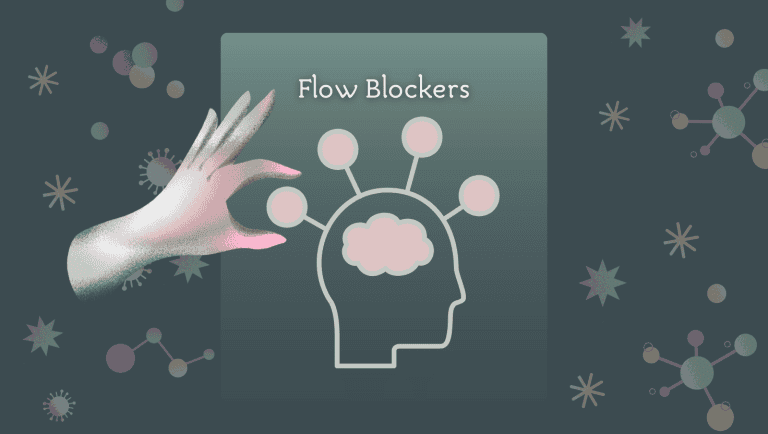In this week’s Weekly Process post, I am thinking about Sunday night anxiety and why worry is something that can happen when we are trying to get to sleep on Sunday night (or whichever night is the night before you go back to work after a break). With Blue Monday coming up, it might be even more of an issue for us right now.
If you have to avoid something it gets in the way
One of the things I have been curious about is how the everyday events (both positive and negative and in-between), often tend to go unprocessed, and yet these seemingly small daily events, can often be quite loaded emotionally. In my CBT practice when I unpack events with clients, the kernel of some of the upsetting feelings they have can be tracked back to momentary events, maybe more than one, but they are not always big traumas. It can be a throwaway comment, a fleeting thought, something unexpected, or something puzzling or embarrassing. Left unprocessed we may not know that these things have stuck with us. I still recall the time when a partner said to me “You should have the salad”. Why would I remember that all these years later, why that? I’ve only just realised that I still remember it, and that tells me I have not given it much processing time other than to think of it, feel a bit upset and then push it away again because it isn’t pleasant. This avoidance keeps something with us as a ‘thing’ we need to avoid.

If you have to avoid something, it gets in the way
Donna Bottomley
Also, trying not to think about something, makes the brain notice that thing as something we don’t want to think about, which means we are hyperalert to whether or not we are thinking about that thing. This all adds to the feeling of that thing we don’t want to think about getting in the way. This is one reason for the stickiness of certain thoughts and feelings.
Checking our assumptions to notice our beliefs
Why do they become sticky? Because we make quick assumptions about why things happen, or why we do what we do. These assumptions are based on what we have learned and the conditions that we are living within and have become used to. Take the example of getting a ‘C’ in a test. If your first thought was “Well I knew I wasn’t going to get better than that anyway”. Where has this thought come from? Possibly other experiences where you learned to say this to yourself. This doesn’t have to be a truth, but if you say it to yourself without thinking, then it governs what you think about yourself, how you feel and what you subsequently do. In other words, it builds a belief about yourself.
This is where our assumptions come from, the beliefs that we hold, sometimes unintentionally. It is these things that I believe we can keep in check by regularly offloading and processing the events of the past week. To notice what has come up over the week and to check whether there were any assumptions we made and whether these helped us or not. Over time we can start to see a pattern and notice whether there is a deeper belief that may need to be re-evaluated or updated. For example, if we are seeing the week in terms of failures or achievements then it could be that a deeper belief of not being good enough could be motivating many of our actions and interactions. You may have been through experiences that did make you feel not good enough, but if you pause to re-evaluate where you are now, does that belief still serve you in the way that it did before? Are you more than that now? Is that a helpful global belief for the whole of you as a person? Could it be tweaked to serve you better? What assumptions does it lead you to make and are these helpful? It can be very helpful to do this work with a therapist, and this is the type of work that CBT and REBT therapists do, as well as schema therapists. Other therapies do their work in different ways and it is important to find the type of therapist and therapy to help you. I mention CBT/REBT/Schema therapy because this is what I know, but I know I do not know everything so of course I have my own biases here. You must choose for yourself.
Why is a regular offloading and processing session helpful?
As well as for uncovering how we navigated the week that has just gone, the other reason why I believe it can be helpful is for clarity as we enter the next week. A lot of small moments make up a week. Some of these can be left unchecked as we face the next week. As we think of Monday, some of us can have a feeling of dread. An apprehension which can feel like a sinking feeling. This can be partly due to the natural mobilisation that will be happening in our nervous systems as our bodies get ready for the ‘action’ of Monday (or whatever day you start your week). The action of starting the week ahead after relaxing over the weekend. This feeling can be perceived as unpleasant because it is a feeling of anticipation. Anticipation can be a state where we can have thoughts about what might happen. Some of these thoughts can activate us more, and into that space can come a state called ‘anticipatory anxiety’.
This is where we are having thoughts about what might happen, feeling a certain way about what might happen, and this triggering off more thoughts about what might happen, with some of the thoughts being about what we don’t want to happen. This is where anxious feelings can then loop and be hard to get out of.

If we are then caught in a cycle of ‘what if’ thinking then we are caught in a worry chain. Worry is a repetitive thinking pattern that can feed itself and be hard to get out of. This feeling can make it hard to get a good night’s sleep on Sunday night for two reasons, firstly our bodies are activated and not relaxed, and secondly the worry triggers more worry. We may start out trying to problem-solve, but this can become hijacked into worry when our thoughts connect with what we don’t want to happen.

How can we get out of these patterns?
First, notice which if any of these might be happening for you. You could notice what triggers the cycle, a sensation that you notice, or an image or thought. The instinct to put off and try not to think about what is bothering us is natural, however what can happen on a Sunday is that all these thoughts start to reappear when we are trying to get to sleep on Sunday night. This is because we put them off, but this doesn’t make them go away.
How can offloading and processing help and how do I do it?
Let’s use the example of worry. By grabbing a notepad or your laptop, plot out your cycle, like the one above. Instead of putting off and distracting, if you actually write it all out to manage it there and then, you will not be avoiding it.
First, write out what you are actually worrying about, list all of the things. Notice the sensations and the feelings you have. They are normal. They are there because you are worried that something might happen. Pause, breathe slowly in for 4 and out for 6 and do this 4 times. Now, use these questions to problem solve each of the issues.
- Can I do anything about this write now? If the answer is no, for example if you cannot have the conversation you need to have right now, then no you cannot have the conversation right now.
- What could I do right now? Perhaps write down a list of things you want to make sure you say in that conversation. Maybe a note about how to pause if you are asked something that you don’t know. A note to yourself to pause and breathe, or say “I don’t have that information right now but I will get back to you”.
- When you have done the things that you can do right now, ask yourself, do I need more information before I can do anything else? If you cannot take action until something else happens then you need more information and you cannot actually do anything else right now.
Schedule when to do the other things that you need to do. If you cannot do anything because the thing is outside of your control then tell yourself that you cannot do anything about that right now. But, schedule when you will look at it again, and try not to forget this because otherwise you can get into a cycle of putting off and worrying and putting off and worrying.
When to do this
Please do not do this while you are trying to sleep! Set aside time to do it when you are not doing anything else, give yourself at least 15mins to sit down and offload the worries and then process them by problem solving them (what can I do something about, what do I need to do and when am I going to do it). When you have finished, end that process with a pause, breathe and draw a line under that worry. If the thoughts come back (which they probably will, if this is a habit for you it will take time to break), just refer back to your problem solving notes and remind yourself what you can do something about. If new ideas come up, put them on the list.
I could say so much about worry, it is a complex topic. I will write more about it, but I hope that this has given some ideas for how you can first notice it is happening, and how to disrupt the worry chain by tackling it head on rather than putting it off.
If you want to use expressive writing to help you to offload and process weekly worries, have a look at my online course here. I have taken my time to put together a very comprehensive course on the history and practice of Pennebaker’s Expressive Writing Procotols with CBT techniques and also Therapeutic Sound. There is also a four-part module on writing about traumatic and difficult events as well.







